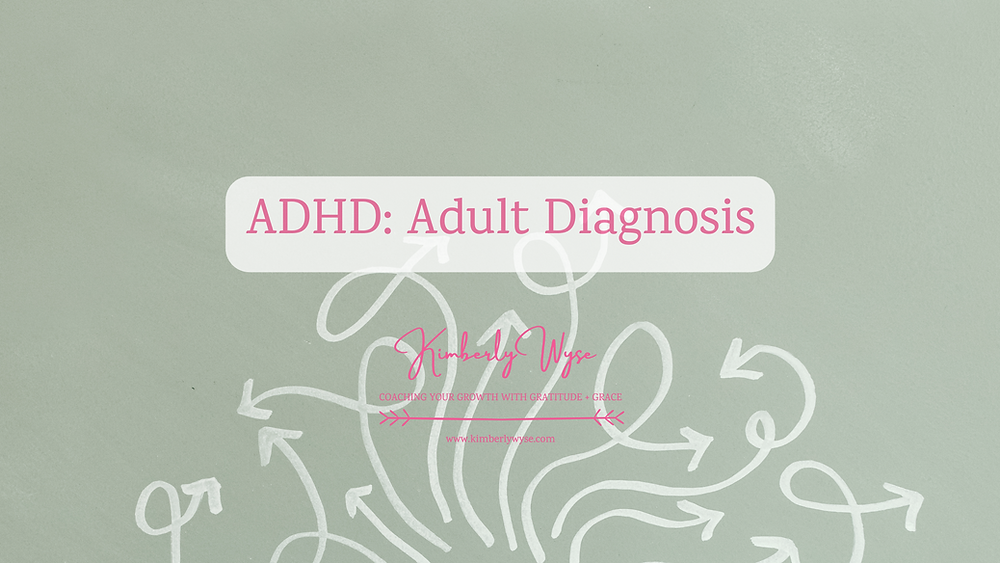Navigating A Potential Adult ADHD Diagnosis

Table of Contents
Recognizing the Signs of Adult ADHD
While often diagnosed in childhood, ADHD frequently persists into adulthood. Recognizing the signs is crucial for seeking appropriate help.
Common Symptoms in Adults:
Adult ADHD symptoms can manifest differently than in children. Common symptoms include:
- Difficulty focusing and sustaining attention: Struggling to concentrate on tasks, easily distracted by irrelevant stimuli, and experiencing mind-wandering.
- Problems with organization and time management: Chronic lateness, disorganization, difficulty prioritizing tasks, and struggling to meet deadlines.
- Impulsivity leading to poor decision-making: Acting without thinking, making rash decisions, and engaging in risky behaviors.
- Restlessness and difficulty sitting still: Fidgeting, pacing, and an inability to remain seated for extended periods.
- Increased forgetfulness and difficulty recalling information: Misplacing items frequently, forgetting appointments, and struggling to remember details.
- Emotional dysregulation: Experiencing intense emotional reactions, difficulty managing emotions, and mood swings.
Subtle Signs Often Overlooked:
Some signs of adult ADHD are more subtle and easily mistaken for other issues:
- Chronic procrastination and avoidance of tasks: Putting off tasks until the last minute, leading to increased stress and anxiety.
- Difficulty prioritizing tasks: Feeling overwhelmed by numerous tasks and struggling to determine which ones are most important.
- Feeling overwhelmed easily: Experiencing a constant sense of being overwhelmed and unable to cope with daily demands.
- Low self-esteem and feelings of inadequacy: Feeling inadequate, incompetent, and experiencing persistent self-doubt.
- Relationship difficulties: Struggling to maintain healthy relationships due to impulsivity, poor communication, and difficulty with emotional regulation.
- Substance abuse (as a form of self-medication): Using substances like alcohol or drugs to cope with ADHD symptoms.
Checklist of Common Adult ADHD Symptoms:
Use this checklist to self-assess, but remember, a formal diagnosis requires professional evaluation. Check the boxes that apply to you:
[ ] Difficulty focusing and sustaining attention [ ] Problems with organization and time management [ ] Impulsivity leading to poor decisions [ ] Restlessness and difficulty sitting still [ ] Increased forgetfulness [ ] Emotional dysregulation [ ] Chronic procrastination [ ] Difficulty prioritizing tasks [ ] Feeling overwhelmed easily [ ] Low self-esteem
For a comprehensive understanding of ADHD diagnostic criteria, consult the DSM-5 criteria (link to DSM-5 criteria). For further information and support, visit the CHADD (Children and Adults with Attention-Deficit/Hyperactivity Disorder) website: [link to CHADD website].
The Diagnostic Process for Adult ADHD
Getting an accurate adult ADHD diagnosis involves a thorough evaluation by a qualified professional.
Seeking Professional Help:
The first step in navigating an adult ADHD diagnosis is seeking help from a qualified healthcare professional, such as a psychiatrist, psychologist, or neuropsychologist. These professionals are trained to diagnose and treat ADHD.
Assessment Methods:
The diagnostic process typically involves several assessment methods:
- Clinical interviews: A detailed interview to gather information about your symptoms, their history, and their impact on your daily life.
- Psychological tests: Questionnaires and rating scales to measure the severity of ADHD symptoms and rule out other conditions that may share similar symptoms. Common examples include the Conner's Adult ADHD Rating Scales and the Wender Utah Rating Scale.
- Neuropsychological testing (in some cases): More in-depth testing to assess cognitive functions like attention, memory, and executive functions. This may be used to differentiate ADHD from other conditions.
Steps to Finding a Qualified Professional:
- Ask your primary care physician for referrals.
- Search online directories of mental health professionals.
- Check with local hospitals and clinics.
- Contact your insurance provider for a list of in-network providers.
Remember to keep thorough records of your symptoms and their impact on your life. Gathering information from family and friends can also provide valuable insights.
Living with an Adult ADHD Diagnosis
Receiving an adult ADHD diagnosis is a significant step, but it's also an opportunity to develop effective strategies for managing your symptoms.
Treatment Options:
Various treatment options are available to manage adult ADHD symptoms:
- Medication: Stimulant medications (like methylphenidate and amphetamine) and non-stimulant medications (like atomoxetine) are often prescribed to improve focus, reduce impulsivity, and regulate mood. Each medication has its own benefits and side effects, which your doctor will discuss with you.
- Therapy: Behavioral therapy and cognitive behavioral therapy (CBT) can teach you coping mechanisms and strategies to manage symptoms, improve organization, and enhance emotional regulation.
- Lifestyle modifications: Adopting a holistic approach that includes regular exercise, a healthy diet, and sufficient sleep hygiene can significantly improve ADHD symptoms.
Support and Resources:
Living with ADHD often benefits from support and understanding. Numerous resources are available:
- Support groups: Connecting with others who understand your experiences can provide valuable emotional support and practical advice.
- Online communities: Numerous online forums and communities offer a platform for sharing experiences, seeking advice, and finding support.
- Advocacy organizations: Organizations like CHADD provide information, resources, and support for adults with ADHD.
Practical Tips for Managing Daily Life with ADHD:
- Use a planner or calendar to schedule appointments and tasks.
- Break down large tasks into smaller, more manageable steps.
- Set reminders to avoid forgetting important things.
- Create a structured environment to minimize distractions.
- Practice mindfulness and meditation techniques to improve focus and emotional regulation.
Conclusion
Navigating a potential adult ADHD diagnosis involves recognizing the symptoms, seeking professional help, undergoing a thorough assessment, and exploring treatment options and support systems. Understanding the process and accessing available resources are key to successful management. If you suspect you may have adult ADHD, don't hesitate to seek professional help. Taking the first step towards an adult ADHD diagnosis can significantly improve your quality of life. Schedule an appointment with a qualified healthcare professional to discuss your concerns and begin your journey towards better self-management and improved well-being. Learn more about adult ADHD diagnosis and treatment options today.

Featured Posts
-
 Nyt Strands Puzzle Answers And Hints For March 3 2025
Apr 29, 2025
Nyt Strands Puzzle Answers And Hints For March 3 2025
Apr 29, 2025 -
 Why Middle Managers Are Crucial For Company Success And Employee Well Being
Apr 29, 2025
Why Middle Managers Are Crucial For Company Success And Employee Well Being
Apr 29, 2025 -
 Secret Service Closes Investigation Into White House Cocaine Incident
Apr 29, 2025
Secret Service Closes Investigation Into White House Cocaine Incident
Apr 29, 2025 -
 Trumps Transgender Athlete Ban Minnesota Under Fire From Us Attorney General
Apr 29, 2025
Trumps Transgender Athlete Ban Minnesota Under Fire From Us Attorney General
Apr 29, 2025 -
 Missing Person British Paralympian Last Seen In Las Vegas Over A Week Ago
Apr 29, 2025
Missing Person British Paralympian Last Seen In Las Vegas Over A Week Ago
Apr 29, 2025
Latest Posts
-
 Raqlyt Swysra Rqm Qyasy Jdyd
Apr 30, 2025
Raqlyt Swysra Rqm Qyasy Jdyd
Apr 30, 2025 -
 Nfl Trade Rumors 20 Players Likely Seeking A New Team
Apr 30, 2025
Nfl Trade Rumors 20 Players Likely Seeking A New Team
Apr 30, 2025 -
 Analyzing The Commanders 2025 Nfl Draft Needs A Comprehensive Big Board
Apr 30, 2025
Analyzing The Commanders 2025 Nfl Draft Needs A Comprehensive Big Board
Apr 30, 2025 -
 Mwajht Jnwb Alswdan Wmwrytanya Bakambw Wrhan Alkwnghw Aldymqratyt Fy Tsfyat Kas Alealm 2026
Apr 30, 2025
Mwajht Jnwb Alswdan Wmwrytanya Bakambw Wrhan Alkwnghw Aldymqratyt Fy Tsfyat Kas Alealm 2026
Apr 30, 2025 -
 Swysra Tusjl Rqma Qyasya Fy Tnawl Alraklyt
Apr 30, 2025
Swysra Tusjl Rqma Qyasya Fy Tnawl Alraklyt
Apr 30, 2025
